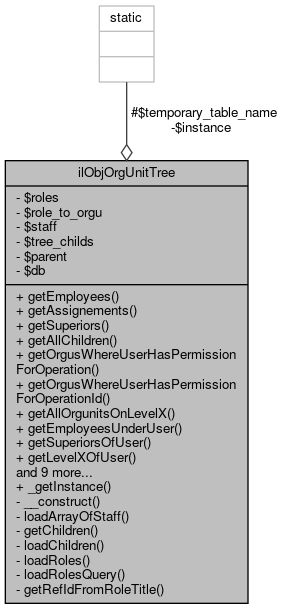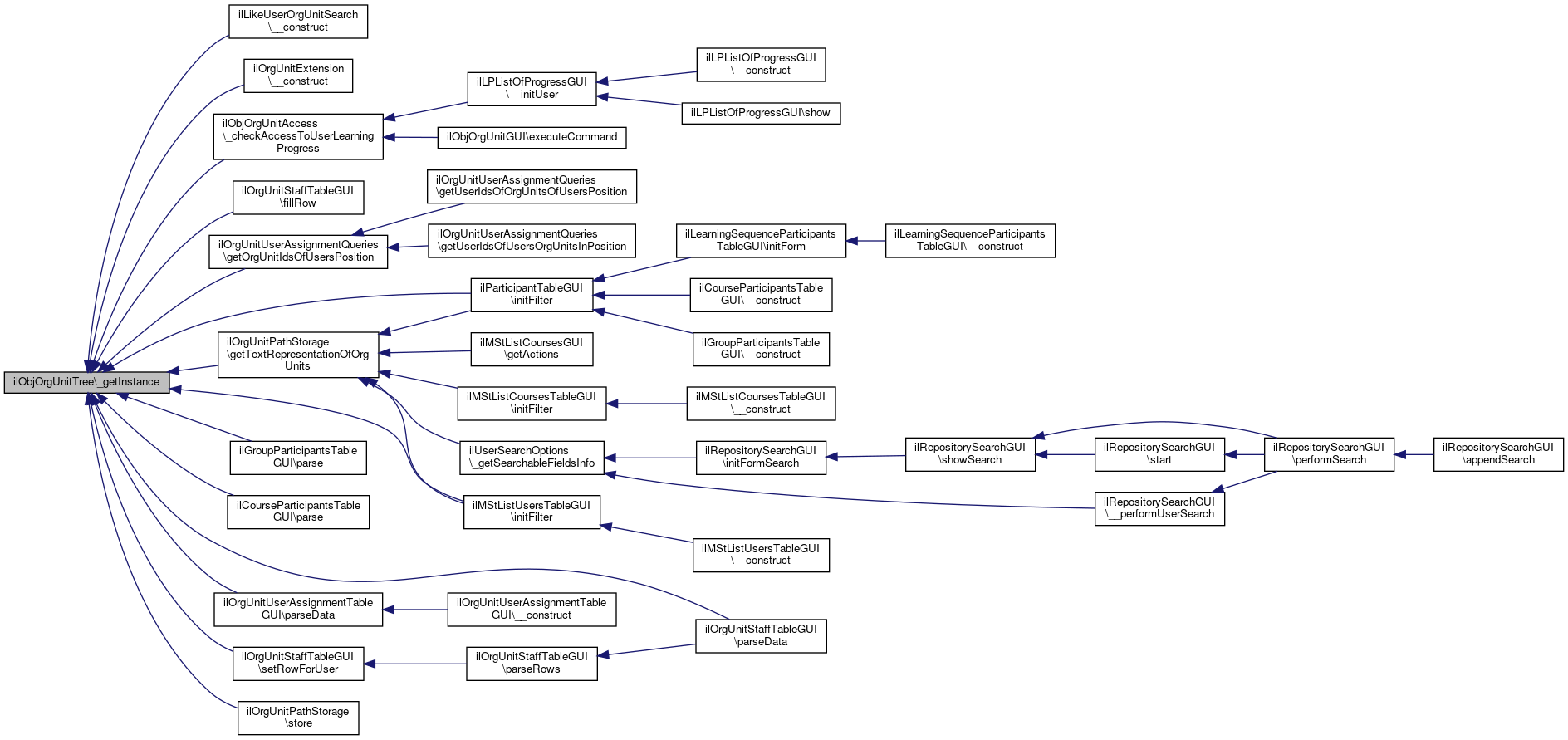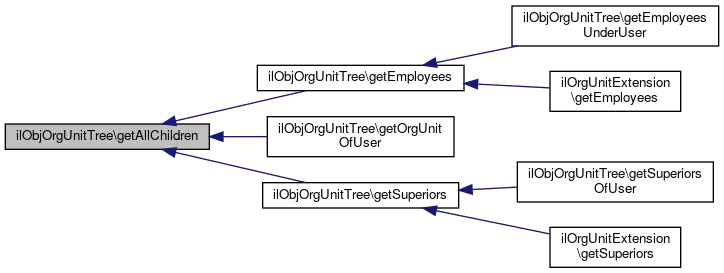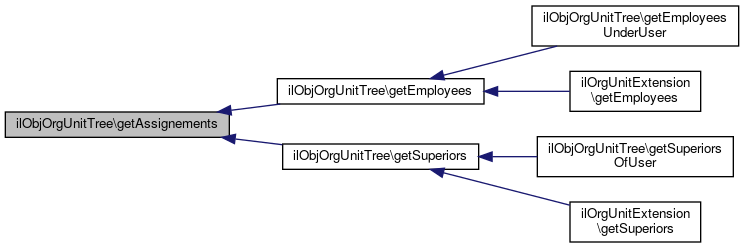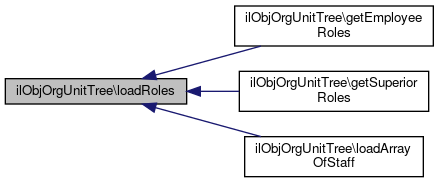Class ilObjOrgUnitTree Implements a singleton pattern for caching. More...
 Collaboration diagram for ilObjOrgUnitTree:
Collaboration diagram for ilObjOrgUnitTree:Public Member Functions | |
| getEmployees ($ref_id, $recursive=false) | |
| getAssignements ($ref_id, ilOrgUnitPosition $ilOrgUnitPosition) | |
| getSuperiors ($ref_id, $recursive=false) | |
| getAllChildren ($ref_id) | |
| getOrgusWhereUserHasPermissionForOperation ($operation) | |
| If you want to have all orgunits where the current user has the write permission: use this with the parameter "write". More... | |
| getOrgusWhereUserHasPermissionForOperationId ($operation_id) | |
| If you want to have all orgunits where the current user has the write permission: use this with the parameter 3 (3 is the "write" permission as in rbac_operations). More... | |
| getAllOrgunitsOnLevelX ($level) | |
| getEmployeesUnderUser ($user_id, $recursive=true) | |
| getSuperiorsOfUser ($user_id, $recursive=true) | |
| getLevelXOfUser ($user_id, $level) | |
| for additional info see the other getLevelX method. More... | |
| getOrgUnitOfUser ($user_id, $ref_id=0) | |
| getOrgUnitOfUser More... | |
| buildTempTableWithUsrAssignements ($temporary_table_name='orgu_usr_assignements') | |
| Creates a temporary table with all orgu/user assignements. More... | |
| dropTempTable ($temporary_table_name) | |
| getTitles ($org_refs) | |
| getEmployeeRoles () | |
| getSuperiorRoles () | |
| flushCache () | |
| getLevelXOfTreenode ($orgu_ref, $level) | |
| Specify eg. More... | |
| getParent ($orgu_ref) | |
Static Public Member Functions | |
| static | _getInstance () |
Static Protected Attributes | |
| static | $temporary_table_name = null |
Private Member Functions | |
| __construct () | |
| loadArrayOfStaff ($title, $ref_ids) | |
| getChildren ($ref_id) | |
| loadChildren ($ref_id) | |
| loadRoles ($role) | |
| loadRolesQuery ($role) | |
| getRefIdFromRoleTitle ($role_title) | |
Private Attributes | |
| $roles | |
| $role_to_orgu | |
| $staff | |
| $tree_childs | |
| $parent | |
| $db | |
Static Private Attributes | |
| static | $instance |
Detailed Description
Class ilObjOrgUnitTree Implements a singleton pattern for caching.
Definition at line 12 of file class.ilObjOrgUnitTree.php.
Constructor & Destructor Documentation
◆ __construct()
|
private |
Definition at line 49 of file class.ilObjOrgUnitTree.php.
Member Function Documentation
◆ _getInstance()
|
static |
- Returns
- \ilObjOrgUnitTree
Definition at line 64 of file class.ilObjOrgUnitTree.php.
References $instance.
Referenced by ilOrgUnitExtension\__construct(), ilLikeUserOrgUnitSearch\__construct(), ilObjOrgUnitAccess\_checkAccessToUserLearningProgress(), ilOrgUnitStaffTableGUI\fillRow(), ilOrgUnitUserAssignmentQueries\getOrgUnitIdsOfUsersPosition(), ilParticipantTableGUI\initFilter(), ilMStListUsersTableGUI\initFilter(), ilCourseParticipantsTableGUI\parse(), ilGroupParticipantsTableGUI\parse(), ilOrgUnitUserAssignmentTableGUI\parseData(), ilOrgUnitStaffTableGUI\parseData(), and ilOrgUnitStaffTableGUI\setRowForUser().
 Here is the caller graph for this function:
Here is the caller graph for this function:◆ buildTempTableWithUsrAssignements()
| ilObjOrgUnitTree::buildTempTableWithUsrAssignements | ( | $temporary_table_name = 'orgu_usr_assignements' | ) |
Creates a temporary table with all orgu/user assignements.
there will be three columns in the table orgu_usr_assignements (or specified table-name): ref_id: Reference-IDs of OrgUnits user_id: Assigned User-IDs path: Path-representation of the OrgUnit
Usage:
- Run ilObjOrgUnitTree::getInstance()->buildTempTableWithUsrAssignements(); in your code
- use the table orgu_usr_assignements for your JOINS ans SELECTS
- Run ilObjOrgUnitTree::getInstance()->dropTempTable(); to throw away the table
- Exceptions
-
ilException
- Parameters
-
string $temporary_table_name
- Returns
- bool
Definition at line 482 of file class.ilObjOrgUnitTree.php.
References $temporary_table_name, and dropTempTable().
 Here is the call graph for this function:
Here is the call graph for this function:◆ dropTempTable()
| ilObjOrgUnitTree::dropTempTable | ( | $temporary_table_name | ) |
- Parameters
-
$temporary_table_name
- Returns
- bool
Definition at line 513 of file class.ilObjOrgUnitTree.php.
References $temporary_table_name.
Referenced by buildTempTableWithUsrAssignements().
 Here is the caller graph for this function:
Here is the caller graph for this function:◆ flushCache()
| ilObjOrgUnitTree::flushCache | ( | ) |
Definition at line 577 of file class.ilObjOrgUnitTree.php.
◆ getAllChildren()
| ilObjOrgUnitTree::getAllChildren | ( | $ref_id | ) |
- Parameters
-
$ref_id
- Returns
- array
Definition at line 186 of file class.ilObjOrgUnitTree.php.
References getChildren().
Referenced by getEmployees(), getOrgUnitOfUser(), and getSuperiors().
 Here is the call graph for this function:
Here is the call graph for this function: Here is the caller graph for this function:
Here is the caller graph for this function:◆ getAllOrgunitsOnLevelX()
| ilObjOrgUnitTree::getAllOrgunitsOnLevelX | ( | $level | ) |
- Parameters
-
$level
- Returns
- array
Definition at line 319 of file class.ilObjOrgUnitTree.php.
References getChildren(), and ilObjOrgUnit\getRootOrgRefId().
 Here is the call graph for this function:
Here is the call graph for this function:◆ getAssignements()
| ilObjOrgUnitTree::getAssignements | ( | $ref_id, | |
| ilOrgUnitPosition | $ilOrgUnitPosition | ||
| ) |
- Parameters
-
int $ref_id \ilOrgUnitPosition $ilOrgUnitPosition
- Returns
- array
Definition at line 106 of file class.ilObjOrgUnitTree.php.
References ilOrgUnitPosition\getId(), and ActiveRecord\where().
Referenced by getEmployees(), and getSuperiors().
 Here is the call graph for this function:
Here is the call graph for this function: Here is the caller graph for this function:
Here is the caller graph for this function:◆ getChildren()
|
private |
- Parameters
-
$ref_id
- Returns
- int[]
Definition at line 289 of file class.ilObjOrgUnitTree.php.
References loadChildren().
Referenced by getAllChildren(), and getAllOrgunitsOnLevelX().
 Here is the call graph for this function:
Here is the call graph for this function: Here is the caller graph for this function:
Here is the caller graph for this function:◆ getEmployeeRoles()
| ilObjOrgUnitTree::getEmployeeRoles | ( | ) |
- Returns
- int[] returns an array of role_ids. orgu_ref => role_id
Definition at line 547 of file class.ilObjOrgUnitTree.php.
References loadRoles().
 Here is the call graph for this function:
Here is the call graph for this function:◆ getEmployees()
| ilObjOrgUnitTree::getEmployees | ( | $ref_id, | |
$recursive = false |
|||
| ) |
- Parameters
-
$ref_id int the reference id of the organisational unit. $recursive bool if true you get the ids of the subsequent orgunits employees too
- Returns
- int[] array of user ids.
Definition at line 80 of file class.ilObjOrgUnitTree.php.
References ilOrgUnitPosition\CORE_POSITION_EMPLOYEE, getAllChildren(), getAssignements(), and ilOrgUnitPosition\getCorePosition().
Referenced by ilOrgUnitExtension\getEmployees(), and getEmployeesUnderUser().
 Here is the call graph for this function:
Here is the call graph for this function: Here is the caller graph for this function:
Here is the caller graph for this function:◆ getEmployeesUnderUser()
| ilObjOrgUnitTree::getEmployeesUnderUser | ( | $user_id, | |
$recursive = true |
|||
| ) |
- Parameters
-
$user_id int $recursive bool if this is true subsequent orgunits of this users superior role get searched as well.
- Returns
- int[] returns an array of user_ids of the users which have an employee role in an orgunit of which this user's id has a superior role.
Definition at line 345 of file class.ilObjOrgUnitTree.php.
References $res, and getEmployees().
 Here is the call graph for this function:
Here is the call graph for this function:◆ getLevelXOfTreenode()
| ilObjOrgUnitTree::getLevelXOfTreenode | ( | $orgu_ref, | |
| $level | |||
| ) |
Specify eg.
level 1 and it will return on which orgunit on the first level after the root node the specified orgu_ref is a subunit of. eg: 0
- - 1 2
3 4 5 - 6
(6, 1) = 1; (4, 1) = 2; (6, 2) = 3;
- Parameters
-
$orgu_ref $level
- Exceptions
-
Exception in case there's a thread of an infinite loop or if you try to fetch the third level but there are only two (e.g. you want to fetch lvl 1 but give the root node as reference).
- Returns
- int|bool ref_id of the orgu or false if not found.
Definition at line 632 of file class.ilObjOrgUnitTree.php.
References getParent(), and ilObjOrgUnit\getRootOrgRefId().
Referenced by getLevelXOfUser().
 Here is the call graph for this function:
Here is the call graph for this function: Here is the caller graph for this function:
Here is the caller graph for this function:◆ getLevelXOfUser()
| ilObjOrgUnitTree::getLevelXOfUser | ( | $user_id, | |
| $level | |||
| ) |
for additional info see the other getLevelX method.
- Parameters
-
$user_id $level
- Returns
- int[]
Definition at line 405 of file class.ilObjOrgUnitTree.php.
References $res, and getLevelXOfTreenode().
 Here is the call graph for this function:
Here is the call graph for this function:◆ getOrgUnitOfUser()
| ilObjOrgUnitTree::getOrgUnitOfUser | ( | $user_id, | |
$ref_id = 0 |
|||
| ) |
getOrgUnitOfUser
- Parameters
-
$user_id int $ref_id if given, only OrgUnits under this ID are returned (including $ref_id)
- Returns
- int[]
Definition at line 439 of file class.ilObjOrgUnitTree.php.
References $res, and getAllChildren().
 Here is the call graph for this function:
Here is the call graph for this function:◆ getOrgusWhereUserHasPermissionForOperation()
| ilObjOrgUnitTree::getOrgusWhereUserHasPermissionForOperation | ( | $operation | ) |
If you want to have all orgunits where the current user has the write permission: use this with the parameter "write".
- Parameters
-
$operation string
- Returns
- int[] ids of the org units.
Definition at line 212 of file class.ilObjOrgUnitTree.php.
◆ getOrgusWhereUserHasPermissionForOperationId()
| ilObjOrgUnitTree::getOrgusWhereUserHasPermissionForOperationId | ( | $operation_id | ) |
If you want to have all orgunits where the current user has the write permission: use this with the parameter 3 (3 is the "write" permission as in rbac_operations).
- Parameters
-
$operation_id
- Returns
- int[] ids of the org units.
Definition at line 256 of file class.ilObjOrgUnitTree.php.
◆ getParent()
| ilObjOrgUnitTree::getParent | ( | $orgu_ref | ) |
- Parameters
-
$orgu_ref int
- Returns
- int
Definition at line 662 of file class.ilObjOrgUnitTree.php.
Referenced by getLevelXOfTreenode().
 Here is the caller graph for this function:
Here is the caller graph for this function:◆ getRefIdFromRoleTitle()
|
private |
- Parameters
-
$role_title
- Returns
- int
Definition at line 604 of file class.ilObjOrgUnitTree.php.
Referenced by loadRolesQuery().
 Here is the caller graph for this function:
Here is the caller graph for this function:◆ getSuperiorRoles()
| ilObjOrgUnitTree::getSuperiorRoles | ( | ) |
- Returns
- \int[]
Definition at line 558 of file class.ilObjOrgUnitTree.php.
References loadRoles().
 Here is the call graph for this function:
Here is the call graph for this function:◆ getSuperiors()
| ilObjOrgUnitTree::getSuperiors | ( | $ref_id, | |
$recursive = false |
|||
| ) |
- Parameters
-
$ref_id int the reference id of the organisational unit. $recursive bool if true you get the ids of the subsequent orgunits superiors too
- Returns
- int[] array of user ids.
Definition at line 121 of file class.ilObjOrgUnitTree.php.
References ilOrgUnitPosition\CORE_POSITION_SUPERIOR, getAllChildren(), getAssignements(), and ilOrgUnitPosition\getCorePosition().
Referenced by ilOrgUnitExtension\getSuperiors(), and getSuperiorsOfUser().
 Here is the call graph for this function:
Here is the call graph for this function: Here is the caller graph for this function:
Here is the caller graph for this function:◆ getSuperiorsOfUser()
| ilObjOrgUnitTree::getSuperiorsOfUser | ( | $user_id, | |
$recursive = true |
|||
| ) |
- Parameters
-
$user_id int $recursive bool if this is true subsequent orgunits of this users superior role get searched as well.
- Returns
- int[] returns an array of user_ids of the users which have an employee role in an orgunit of which this user's id has a superior role.
Definition at line 375 of file class.ilObjOrgUnitTree.php.
References $res, and getSuperiors().
 Here is the call graph for this function:
Here is the call graph for this function:◆ getTitles()
| ilObjOrgUnitTree::getTitles | ( | $org_refs | ) |
- Parameters
-
$org_refs
- Returns
- array
Definition at line 533 of file class.ilObjOrgUnitTree.php.
References ilObject\_lookupObjId(), and ilObject\_lookupTitle().
 Here is the call graph for this function:
Here is the call graph for this function:◆ loadArrayOfStaff()
|
private |
- Parameters
-
$title "employee" or "superior" $ref_ids int[] array of orgu object ref ids.
- Returns
- int[] user_ids
Definition at line 147 of file class.ilObjOrgUnitTree.php.
References $id, $res, $title, and loadRoles().
 Here is the call graph for this function:
Here is the call graph for this function:◆ loadChildren()
|
private |
- Parameters
-
$ref_id
Definition at line 300 of file class.ilObjOrgUnitTree.php.
Referenced by getChildren().
 Here is the caller graph for this function:
Here is the caller graph for this function:◆ loadRoles()
|
private |
- Parameters
-
$role
Definition at line 569 of file class.ilObjOrgUnitTree.php.
References loadRolesQuery().
Referenced by getEmployeeRoles(), getSuperiorRoles(), and loadArrayOfStaff().
 Here is the call graph for this function:
Here is the call graph for this function: Here is the caller graph for this function:
Here is the caller graph for this function:◆ loadRolesQuery()
|
private |
- Parameters
-
$role
Definition at line 586 of file class.ilObjOrgUnitTree.php.
References $res, and getRefIdFromRoleTitle().
Referenced by loadRoles().
 Here is the call graph for this function:
Here is the call graph for this function: Here is the caller graph for this function:
Here is the caller graph for this function:Field Documentation
◆ $db
|
private |
Definition at line 46 of file class.ilObjOrgUnitTree.php.
◆ $instance
|
staticprivate |
Definition at line 22 of file class.ilObjOrgUnitTree.php.
Referenced by _getInstance().
◆ $parent
|
private |
Definition at line 42 of file class.ilObjOrgUnitTree.php.
◆ $role_to_orgu
|
private |
Definition at line 30 of file class.ilObjOrgUnitTree.php.
◆ $roles
|
private |
Definition at line 26 of file class.ilObjOrgUnitTree.php.
◆ $staff
|
private |
Definition at line 34 of file class.ilObjOrgUnitTree.php.
◆ $temporary_table_name
|
staticprotected |
Definition at line 18 of file class.ilObjOrgUnitTree.php.
Referenced by buildTempTableWithUsrAssignements(), and dropTempTable().
◆ $tree_childs
|
private |
Definition at line 38 of file class.ilObjOrgUnitTree.php.
The documentation for this class was generated from the following file:
- Modules/OrgUnit/classes/class.ilObjOrgUnitTree.php
